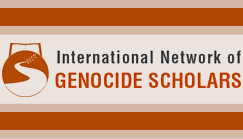
Panel 12 - Outlawing the Truth: Memory Laws and State Violence in the United States, Poland, and Israel/Palestine
Start Date
3-10-2020 10:45 AM
End Date
3-10-2020 12:15 PM
Loading...
Submission Type
Panel
Abstract
The panel will explore three recent attempts of states to regulate public memory of state violence through law. Dr. Barry Trachtenberg will focus on the definition of antisemitism formulated by the International Holocaust Remembrance Alliance (IHRA) in 2016. Dr. Trachtenberg will examine laws and legal or quasi-legal measures in the US that adopt it in order to suppress and silence criticism of Israeli policies and violence against Palestinians, presenting such criticism as acts of antisemitism. This act of denial, which stems from a major institute of global Holocaust memory, absurdly turns victims into aggressors and goes hand in hand with the Nakba Law in Israel (2011), which Dr. Nadera Shalhoub-Kevorkian will discuss.
The Nakba Law criminalizes the marking of Israel’s day of independence as a day of mourning in memory of the Palestinian Nakba: the mass deportations of more than 700,000 Palestinians and the destruction of hundreds of Palestinians villages, neighborhoods, and cities by Israeli forces during the 1948 war. Dr. Shalhoub-Kevorkian argues that the Nakba Law figures within the larger project of the Israeli state to deny and erase Palestinian history, existence, and the future of Palestinians in their homeland. This memory law in Israel figures within a broader context of recent attempts by state authorities to surveil and shape through laws research, commemoration, and education about the past.
Dr. Anat Plocker will deal in her paper with this project in Poland today, where a law from 1998 was amended in 2018 to create what is known as Poland’s Holocaust Law. The law claims that the vast majority of Poles took no part in the persecution and destruction of Jews and Jewish communities in German-occupied Poland during World War II, and anyone in Poland who publicly argues otherwise—including scholars—could be subject to a civil lawsuit. Dr. Plocker traces the roots of the memory law in Poland today to the state’s communist political discourse in the late 1960s about the Holocaust and World War II, illuminating how the goal of protecting the Polish nation and state has crossed, in the last fifty years, ideological and political divides that once seemed impenetrable. The new memory regimes in the United States, Poland, and Israel/Palestine (and elsewhere) have emerged in the era of global Holocaust memory, exposing a cruel irony at its heart. For if the Holocaust could teach us anything, it is that vulnerable groups should be protected from persecuting and violent state authorities that render them foreign and dangerous. Yet this memory culture and these memory regimes aim to protect the state, even when, as in the case of Israel, its documented assault on a group, Palestinians, escalates and intensifies. The panel, then, also aims to shed light on this truth.
Presentations
Nadera Shalhoub-Kevorkian: The Nakba Law and the Ongoing Nakba (video)
Anat Plocker: National Communism and the Roots of Poland’s Contemporary Memory Laws (video)
Barry Trachtenberg: Suppressing Speech in Israel’s Defense: The Case of the United States (video)
Panel 12 - Outlawing the Truth: Memory Laws and State Violence in the United States, Poland, and Israel/Palestine
The panel will explore three recent attempts of states to regulate public memory of state violence through law. Dr. Barry Trachtenberg will focus on the definition of antisemitism formulated by the International Holocaust Remembrance Alliance (IHRA) in 2016. Dr. Trachtenberg will examine laws and legal or quasi-legal measures in the US that adopt it in order to suppress and silence criticism of Israeli policies and violence against Palestinians, presenting such criticism as acts of antisemitism. This act of denial, which stems from a major institute of global Holocaust memory, absurdly turns victims into aggressors and goes hand in hand with the Nakba Law in Israel (2011), which Dr. Nadera Shalhoub-Kevorkian will discuss.
The Nakba Law criminalizes the marking of Israel’s day of independence as a day of mourning in memory of the Palestinian Nakba: the mass deportations of more than 700,000 Palestinians and the destruction of hundreds of Palestinians villages, neighborhoods, and cities by Israeli forces during the 1948 war. Dr. Shalhoub-Kevorkian argues that the Nakba Law figures within the larger project of the Israeli state to deny and erase Palestinian history, existence, and the future of Palestinians in their homeland. This memory law in Israel figures within a broader context of recent attempts by state authorities to surveil and shape through laws research, commemoration, and education about the past.
Dr. Anat Plocker will deal in her paper with this project in Poland today, where a law from 1998 was amended in 2018 to create what is known as Poland’s Holocaust Law. The law claims that the vast majority of Poles took no part in the persecution and destruction of Jews and Jewish communities in German-occupied Poland during World War II, and anyone in Poland who publicly argues otherwise—including scholars—could be subject to a civil lawsuit. Dr. Plocker traces the roots of the memory law in Poland today to the state’s communist political discourse in the late 1960s about the Holocaust and World War II, illuminating how the goal of protecting the Polish nation and state has crossed, in the last fifty years, ideological and political divides that once seemed impenetrable. The new memory regimes in the United States, Poland, and Israel/Palestine (and elsewhere) have emerged in the era of global Holocaust memory, exposing a cruel irony at its heart. For if the Holocaust could teach us anything, it is that vulnerable groups should be protected from persecuting and violent state authorities that render them foreign and dangerous. Yet this memory culture and these memory regimes aim to protect the state, even when, as in the case of Israel, its documented assault on a group, Palestinians, escalates and intensifies. The panel, then, also aims to shed light on this truth.




Comments
Note that the time for this panel will be used for discussion and debate; it is expected that the video recordings of paper presentations be viewed prior to the panel. Please see links to the videos in the Presentations field above.